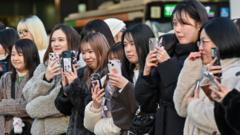Is a Two-Hour Daily Smartphone Limit the Solution for Japanese Towns?

Published: 2025-08-28 04:00:20 | Category: technology
The central Japanese town of Toyoake is considering a controversial proposal to limit smartphone use for its 69,000 residents to just two hours a day outside of work and study. This unprecedented move aims to address concerns over device addiction but has ignited a fierce debate among citizens and lawmakers alike. The initiative is designed to encourage better management of screen time without imposing strict penalties.
Last updated: 27 October 2023 (BST)
Key Takeaways
- Toyoake's proposal seeks to limit smartphone use to two hours daily for residents.
- The initiative is meant to encourage healthier screen time habits rather than enforce penalties.
- Majority of residents, around 80%, oppose the proposal, citing restrictions on leisure activities.
- Some exceptions apply for non-leisure activities and specific time limits for students.
- The debate reflects wider concerns about smartphone addiction in Japan.
Understanding the Proposal
The proposal submitted by the Toyoake municipal government, located in Aichi Prefecture, is believed to be the first of its kind in Japan. If passed, it would allow residents to use smartphones for a maximum of two hours daily, excluding work and study time. The mayor, Masafumi Koki, emphasised that the limit serves as a guideline rather than a strict rule, aiming to spark conversations about screen time within families.
Objectives of the Initiative
Mayor Koki acknowledged the utility of smartphones in daily life but raised concerns about their impact on social interactions and mental health. He pointed out alarming trends such as students missing school because they are unwilling to leave their phones behind. Adults, too, are reportedly sacrificing crucial time with family and sleep in favour of scrolling through their devices.
Details of the Proposed Limitations
The proposal specifically suggests that primary school students should cease device use by 21:00, while older students and adults should stop by 22:00. This structured approach reflects an attempt to promote healthier lifestyles and encourage a better balance between screen time and family interaction.
The Public's Reaction
Public response to the proposal has been largely negative, with over 120 residents contacting local authorities during the consultation period. Approximately 80% expressed their dissatisfaction, highlighting concerns that a two-hour limit would restrict leisure and family activities. Detractors argue that such a limit would make it difficult to engage in activities like reading or watching films, which require more time.
Social Media Backlash
Debate surrounding the proposal has spilled onto social media, where many residents have voiced their grievances. Comments reflect a common sentiment that the proposed limit is impractical, especially for those who incorporate smartphones into their daily lives for entertainment and information. One user pointed out that it would be impossible to enjoy a movie or read a book within the two-hour timeframe.
The Bigger Picture: Smartphone Addiction in Japan
The discussions in Toyoake are reflective of a broader societal concern regarding smartphone addiction in Japan. A recent survey noted that nearly 40% of Japanese adults feel they spend too much time on their devices. This has raised alarms about the potential impact on mental health, productivity, and social interactions.
Statistics on Smartphone Usage
According to research, the average Japanese adult spends about 3.5 hours daily on their smartphone. This average increases among younger populations, with teens reportedly spending over five hours on their devices. The rise in screen time correlates with increasing reports of anxiety and depression, particularly among younger individuals.
Potential Implications of the Proposal
If the proposal is approved in October, it could set a precedent for other towns in Japan to consider similar measures. However, the lack of enforcement mechanisms raises questions about its effectiveness. Without penalties, the proposal may rely on public cooperation and self-regulation, which could be challenging given the strong attachment many have to their devices.
Comparing Global Responses to Device Addiction
Toyoake's initiative is not unique; other countries have implemented various measures to combat smartphone addiction. For instance, several European nations have introduced educational programmes aimed at promoting digital literacy and responsible use of technology. South Korea has launched campaigns encouraging families to engage in device-free activities to foster better relationships.
What Happens Next?
The future of the proposal hinges on the upcoming discussions among lawmakers. If approved, it may take time before its effects are visible, as social norms around technology use are deeply ingrained. Moreover, the local government may need to consider additional support measures, such as community awareness campaigns, to help residents adapt to the new guidelines.
Encouraging Healthy Habits
As the debate unfolds, one key focus will be on how to foster healthier habits without restricting personal freedoms. Discussions may also explore the role of education in helping residents understand the implications of excessive smartphone use. This could involve workshops or community events aimed at raising awareness about device use and its effects on mental well-being.
Conclusion
The proposal from Toyoake presents a unique opportunity to address smartphone addiction and encourage healthier screen time habits among residents. While the initiative has met with significant resistance, it reflects a growing recognition of the need to balance technology use with personal interactions and mental health. As discussions continue, the outcome may influence how other communities approach similar challenges in the future.
How can communities strike a balance between technology use and healthy lifestyles? This is a question that may resonate far beyond Toyoake. #SmartphoneUse #DigitalWellbeing #ToyoakeProposal
FAQs
What is the proposed smartphone usage limit in Toyoake?
The proposed limit is two hours of smartphone use per day for residents outside of work and study, with specific time guidelines for students.
Will there be penalties for exceeding the smartphone limit?
No, the proposal does not include any penalties for breaking the two-hour guideline; it is intended to encourage self-regulation.
What are the reasons behind the proposal?
The proposal aims to address concerns about smartphone addiction, which affects social interactions, mental health, and overall well-being among residents.
How have residents reacted to the proposal?
Public response has been largely negative, with around 80% of residents expressing dissatisfaction during the consultation period, citing concerns about restrictions on leisure activities.
What implications could this proposal have for other towns in Japan?
If approved, Toyoake's initiative could encourage other towns in Japan to consider similar measures to tackle smartphone addiction and promote healthier technology use.



